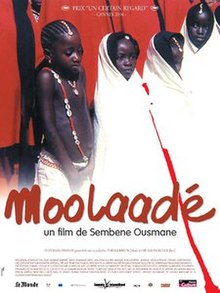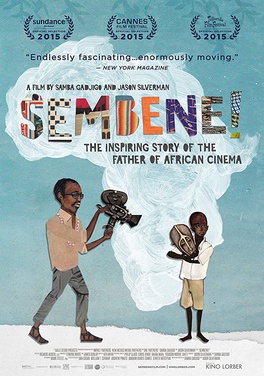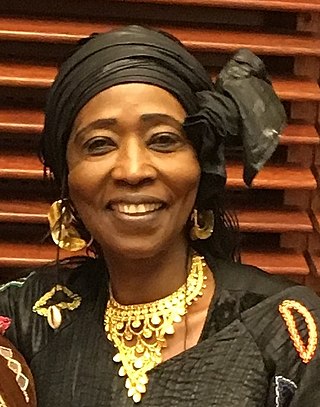Plot
The film is set in a colourful Bambara village in Burkina Faso dotted with termite mounds, and a mosque made from clay that resembles a gigantic hedgehog. The village is a symbol of green Africa, a time capsule that nonetheless is not immune to the influences of the outside and 'modern' world. [6]
Collé is the second of her husband's three wives, and is the most beloved by her husband, a temperate and calmer man than many others in the village. Her daughter, Amasatou, has become engaged, although she has not undergone female genital cutting, considered a prerequisite for marriage in the local tradition. Collé opposes this practice, which has led the elders in the village, women as well as men, to despise her daughter. Amasatou herself unceasingly requests to have her genitals cut to secure her social status and marriage acceptance, but Collé remains unmoved. She is approached by four little girls who are afraid and escape the ritual of the practice, and Collé draws a symbolic line, the colorful rope Moolaadé, a "magical protection," across the gate of the family's premises. Moolaadé prevents the women elders who carry out the practice, and who have been searching for the girls, from entering the house.
In the beginning, the first wife seems to be against Collé's plan to protect the girls. However, later they become closer and she tells Collé that she also opposes female genital cutting. She feared making it known, but has been helping her all along, without anyone's notice.
While facing her daughter's request to be circumcised, Collé explains that she does not want her daughter to end up on the same road she travelled. Her first reason is that it has too many indefinite outcomes, some of which can be fatal. An even bigger reason is that Collé had two unsuccessful pregnancies before Amasatou, which caused her great physical and emotional pain and were almost fatal. In a flashback, there is a scene of her and her husband having sexual intercourse which is clearly causing her physical pain. He falls asleep, while she is unable to do so because the sexual intercourse brings unbearable pain for her rather than pleasure. She keeps biting her ring finger, symbol of her marriage, and dares not say a single word even when her finger bleeds. At dawn, she is still awake to wash her body, as well as her blood off the bed sheet.
As Collé represents African women who awaken to resist patriarchal control, her daughter's fiancé Ibrahima, a rich and open-minded young man living in France, returns to the village, and represents the enlightened educated abroad who returns home and observes the tradition of his village. He witnesses a funeral of two little girls, who desperately drowned themselves in a well to avoid the mutilation of their genitals. The girls' relatives are sad, but the incident does not lead the villagers to question the tradition. Ibrahima is shocked and worried by this; meanwhile, Ibrahima's father wants him to renounce his engagement to Amasatou, and marry his innocent eleven-year-old cousin instead, who has already undergone female genital cutting. Ibrahima refuses to do so, recognizing such an act as child abuse, and visits Amasatou's house despite what the villagers say. He confirms her as his fiancée, regardless of her "impure" status according to the local tradition.
The African women's daily entertainment is enjoying the radio which transmits music and news of the world, which the male elders deem to be counterproductive and dangerous. The elders think that Ciré Bathiliy, Collé's husband, has lost the ability to control his own wife, so the elders insist that he beat her with a leather whip in front of the village to show that he still controls her. The elders want her to utter the word to end the moolaade, so they can take the four girls from her protection. Her husband whips her, but she endures and refuses to give her tormentors the satisfaction of a giving in. Opposite groups of men and women shout to her to revoke or to be steadfast, but no woman interferes. When she is on the verge of collapse, a merchant steps out and stops the whipping.
The womanizing merchant is called Mercenaire by people in the village. He is a war veteran who has become a travelling merchant after being discharged from the army after he accused his superiors of corruption. When he converses with Ibrahima, he accuses him, his father, and his uncle of pedophilia and is suddenly no longer concerned about the money that he could possibly get from the rich young man. He is bringing all the plastic junk to the village; the junk is brightly and boldly colored as the magnificent costumes the people wear in Africa. He sells his wares at extremely high prices. Later he is hunted out of the village and, when out of sight, murdered. [6]
During the whipping, one of the four girls' mother steals her daughter from Collé's house and sends her to get her genitals cut, although the little girl screams and tries to resist. The girl dies as a result of the cutting and her mother regrets her previous support of the practice. The other mothers all see the tragedy happen and thus change their minds and begin opposing genital cutting. This persuades Collé to revoke the protection and return the children to their parents.
From the men's point of view, the radio is a bad influence on the women because it teaches them things from the outside world, such as the idea of equality or how excision is not truly necessary. Therefore, the elders decide to burn the radios that they confiscated earlier. Although all the radios are supposed to be burned, some are hidden by the women of the village. The women are united because of the pain caused by the genital cutting. They are all mourning, they are all awakened, and when the elders return, they are greeted with shouts of, "No more genital cutting!". Collé demands that the women give up their knives, which she then carries to the elders, proclaiming that genital cutting is now a thing of the past. After her demonstration, Ibrahima stands up to his father, says he is not going to listen to him, and despite his threats to disown him (which is quite foolish seeing how Ibrahima is the family's breadwinner) announces that he is going to marry Amasatou because he is proud of her. The end of the movie is the smoke of the burning radios, which speaks both to speaking out and repression of speech.
















